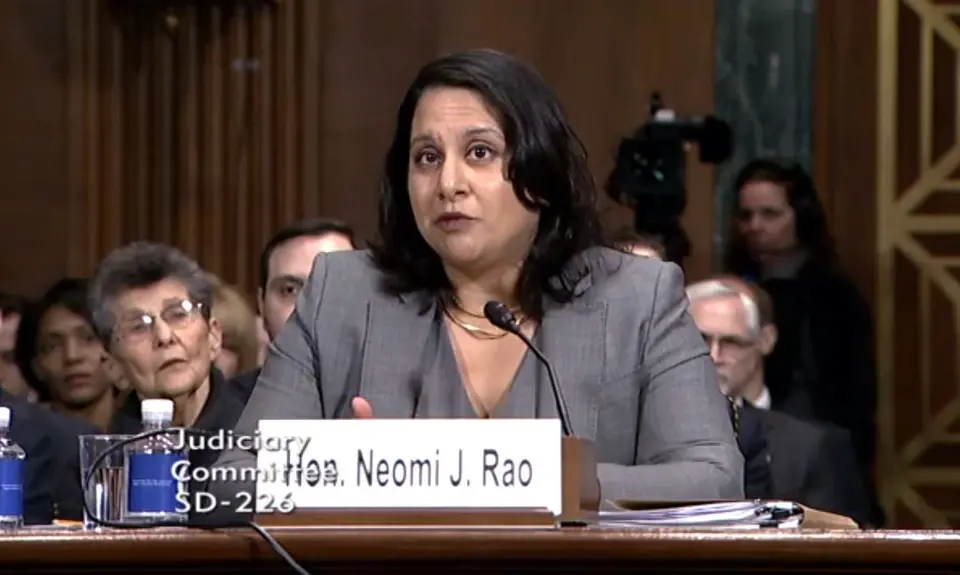“Confirmed Judges, Confirmed Fears” is a blog series documenting the harmful impact of President Trump’s judges on Americans’ rights and liberties. Cases in the series can be found by issue and by judge at this link.
Trump DC Circuit Judges Neomi Rao and Greg Katsas ruled that the Federal Election Commission (FEC) can prevent any judicial review of its decisions not to act on complaints of violations of federal campaign finance and election laws, contrary to federal law. The April 2021 decision , which threatens to further weaken federal law in that area, was in Citizens for Responsibility and Ethics in Government (CREW) v FEC.
Congress established the FEC to enforce federal statutes prohibiting illegal campaign contributions and other improper election-related activity. Congress provided that the FEC would have an equal number of Republican and Democratic members, which could make it difficult to get a majority to take enforcement action, but set up a mechanism for court action in such cases. Any person or group can file an administrative complaint requesting the FEC to take action and, if the agency declines, can seek review in federal court. The court can then order the FEC to act if it finds that the FEC’s dismissal of the complaint was contrary to the federal election statutes or was “arbitrary, capricious, or an abuse of discretion.”
CREW filed such an administrative complaint with the FEC, contending that a group called New Models was engaging in campaign activity without registering as a political committee with the FEC and making required disclosures. Specifically, as the FEC’s general counsel found in recommending action, the group had contributed over 68% of its spending during an election year – “nearly $3.1 million” – to PACs that made expenditures to try to elect or defeat particular federal candidates. A review of the PACs indicates that they supported Republican candidates who favored a balanced budget and limiting government regulation. In other words, New Models was trying to use “dark money” to influence federal elections.
The FEC split 2-2 on whether to take action and thus dismissed the case. Under the law, the FEC was required to provide a “statement of reasons” written by the “controlling commissioners” who voted not to act. They issued a 31-page single spaced statement, explaining their view that New Models was really an “issues advocacy group” that was not required to register as a political committee despite its election spending, based on detailed legal and factual analysis. In its final sentence, the statement said “For these reasons, and in exercise of our prosecutorial discretion, we voted against” taking enforcement action and to “dismiss the matter.”
CREW sought review under the statute in federal court in DC. The lower court granted judgment for the FEC and CREW appealed.
In a 2-1 decision, Trump judge Rao, joined by Trump judge Katsas, affirmed the lower court and ruled that CREW could not seek review of the FEC decision. According to Rao, this case was not “materially distinguishable” from a previous decision involving CREW where the court ruled that the FEC’s decision not to take action could not be reviewed by a court under the statute because the agency decision was based on its “exercise of prosecutorial discretion.” Rao maintained that the fact that the controlling commissioners’ statement also provided “lengthy” legal reasons for declining enforcement “does not make the decision reviewable.” Rao also maintained that her decision was important to protect “core executive power” on deciding whether to prosecute.
Judge Patricia Millett strongly dissented. She explained that it was contrary to federal law to allow the FEC to “immunize its conclusive legal determinations and evidentiary analyses from judicial review simply by tacking” an “incantation” or “cursory reference to prosecutorial discretion onto the end of a lengthy and substantive merits decision.”
More specifically, Millett continued, Rao and Katsas were wrong to rule that the FEC could “evade” judicial review under the specific federal statute merely by adding “seven magic words” – “and in the exercise of our prosecutorial discretion” -- to the very end of its detailed statement. In contrast, she noted, in the previous CREW case relied on by the majority, the controlling commissioners carefully explained that the accused entity had “filed termination papers” and “no longer existed” and that there were “statute of limitations” and other procedural issues and, “for those reasons alone,” relied on the “exercise of its discretion” to “close the file.” Accordingly, Millett continued, the DC Circuit found the FEC decision unreviewable because the record showed it was based “squarely on the ground of prosecutorial discretion.” The two cases are thus “polar opposites,” Millett concluded, and the Rao-Katsas decision in this case “opens the door to the dangerously easy evasion of judicial review” and is clearly “contrary to law.”
In light of the previously existing problems with FEC enforcement of federal election law, the decision by Trump judges Rao and Katsas threatens to make the situation even worse. There are now two seats on the DC Circuit to be filled by President Biden and the Senate, including one for which he has already nominated the extremely well-qualified Judge Ketanji Brown Jackson. This case provides yet another reason why prompt filling of both these seats is crucial to our fight for our courts.
